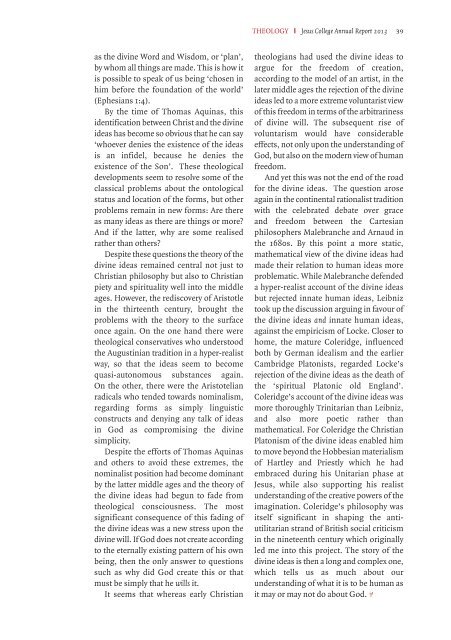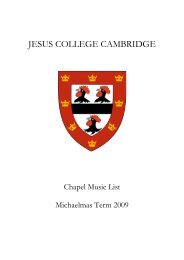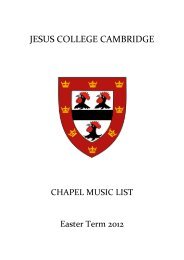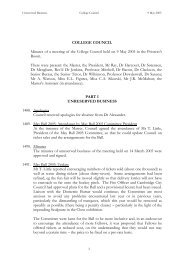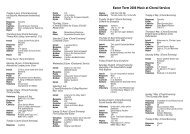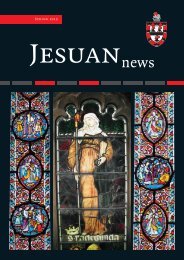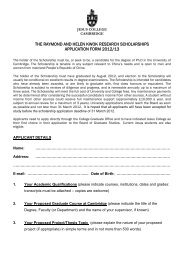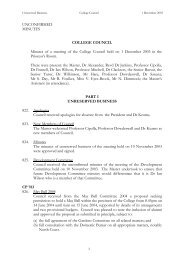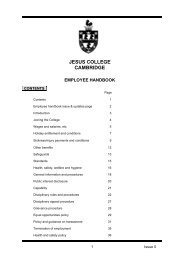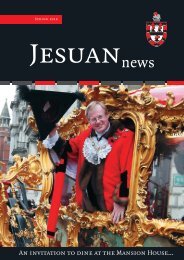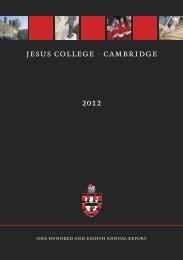2013 Annual Report - Jesus College - University of Cambridge
2013 Annual Report - Jesus College - University of Cambridge
2013 Annual Report - Jesus College - University of Cambridge
Create successful ePaper yourself
Turn your PDF publications into a flip-book with our unique Google optimized e-Paper software.
THEOLOGY I <strong>Jesus</strong> <strong>College</strong> <strong>Annual</strong> <strong>Report</strong> <strong>2013</strong> 39<br />
as the divine Word and Wisdom, or ‘plan’,<br />
by whom all things are made. This is how it<br />
is possible to speak <strong>of</strong> us being ‘chosen in<br />
him before the foundation <strong>of</strong> the world’<br />
(Ephesians 1:4).<br />
By the time <strong>of</strong> Thomas Aquinas, this<br />
identification between Christ and the divine<br />
ideas has become so obvious that he can say<br />
‘whoever denies the existence <strong>of</strong> the ideas<br />
is an infidel, because he denies the<br />
existence <strong>of</strong> the Son’. These theological<br />
developments seem to resolve some <strong>of</strong> the<br />
classical problems about the ontological<br />
status and location <strong>of</strong> the forms, but other<br />
problems remain in new forms: Are there<br />
as many ideas as there are things or more?<br />
And if the latter, why are some realised<br />
rather than others?<br />
Despite these questions the theory <strong>of</strong> the<br />
divine ideas remained central not just to<br />
Christian philosophy but also to Christian<br />
piety and spirituality well into the middle<br />
ages. However, the rediscovery <strong>of</strong> Aristotle<br />
in the thirteenth century, brought the<br />
problems with the theory to the surface<br />
once again. On the one hand there were<br />
theological conservatives who understood<br />
the Augustinian tradition in a hyper-realist<br />
way, so that the ideas seem to become<br />
quasi-autonomous substances again.<br />
On the other, there were the Aristotelian<br />
radicals who tended towards nominalism,<br />
regarding forms as simply linguistic<br />
constructs and denying any talk <strong>of</strong> ideas<br />
in God as compromising the divine<br />
simplicity.<br />
Despite the efforts <strong>of</strong> Thomas Aquinas<br />
and others to avoid these extremes, the<br />
nominalist position had become dominant<br />
by the latter middle ages and the theory <strong>of</strong><br />
the divine ideas had begun to fade from<br />
theological consciousness. The most<br />
significant consequence <strong>of</strong> this fading <strong>of</strong><br />
the divine ideas was a new stress upon the<br />
divine will. If God does not create according<br />
to the eternally existing pattern <strong>of</strong> his own<br />
being, then the only answer to questions<br />
such as why did God create this or that<br />
must be simply that he wills it.<br />
It seems that whereas early Christian<br />
theologians had used the divine ideas to<br />
argue for the freedom <strong>of</strong> creation,<br />
according to the model <strong>of</strong> an artist, in the<br />
later middle ages the rejection <strong>of</strong> the divine<br />
ideas led to a more extreme voluntarist view<br />
<strong>of</strong> this freedom in terms <strong>of</strong> the arbitrariness<br />
<strong>of</strong> divine will. The subsequent rise <strong>of</strong><br />
voluntarism would have considerable<br />
effects, not only upon the understanding <strong>of</strong><br />
God, but also on the modern view <strong>of</strong> human<br />
freedom.<br />
And yet this was not the end <strong>of</strong> the road<br />
for the divine ideas. The question arose<br />
again in the continental rationalist tradition<br />
with the celebrated debate over grace<br />
and freedom between the Cartesian<br />
philosophers Malebranche and Arnaud in<br />
the 1680s. By this point a more static,<br />
mathematical view <strong>of</strong> the divine ideas had<br />
made their relation to human ideas more<br />
problematic. While Malebranche defended<br />
a hyper-realist account <strong>of</strong> the divine ideas<br />
but rejected innate human ideas, Leibniz<br />
took up the discussion arguing in favour <strong>of</strong><br />
the divine ideas and innate human ideas,<br />
against the empiricism <strong>of</strong> Locke. Closer to<br />
home, the mature Coleridge, influenced<br />
both by German idealism and the earlier<br />
<strong>Cambridge</strong> Platonists, regarded Locke’s<br />
rejection <strong>of</strong> the divine ideas as the death <strong>of</strong><br />
the ‘spiritual Platonic old England’.<br />
Coleridge’s account <strong>of</strong> the divine ideas was<br />
more thoroughly Trinitarian than Leibniz,<br />
and also more poetic rather than<br />
mathematical. For Coleridge the Christian<br />
Platonism <strong>of</strong> the divine ideas enabled him<br />
to move beyond the Hobbesian materialism<br />
<strong>of</strong> Hartley and Priestly which he had<br />
embraced during his Unitarian phase at<br />
<strong>Jesus</strong>, while also supporting his realist<br />
understanding <strong>of</strong> the creative powers <strong>of</strong> the<br />
imagination. Coleridge’s philosophy was<br />
itself significant in shaping the antiutilitarian<br />
strand <strong>of</strong> British social criticism<br />
in the nineteenth century which originally<br />
led me into this project. The story <strong>of</strong> the<br />
divine ideas is then a long and complex one,<br />
which tells us as much about our<br />
understanding <strong>of</strong> what it is to be human as<br />
it may or may not do about God.


